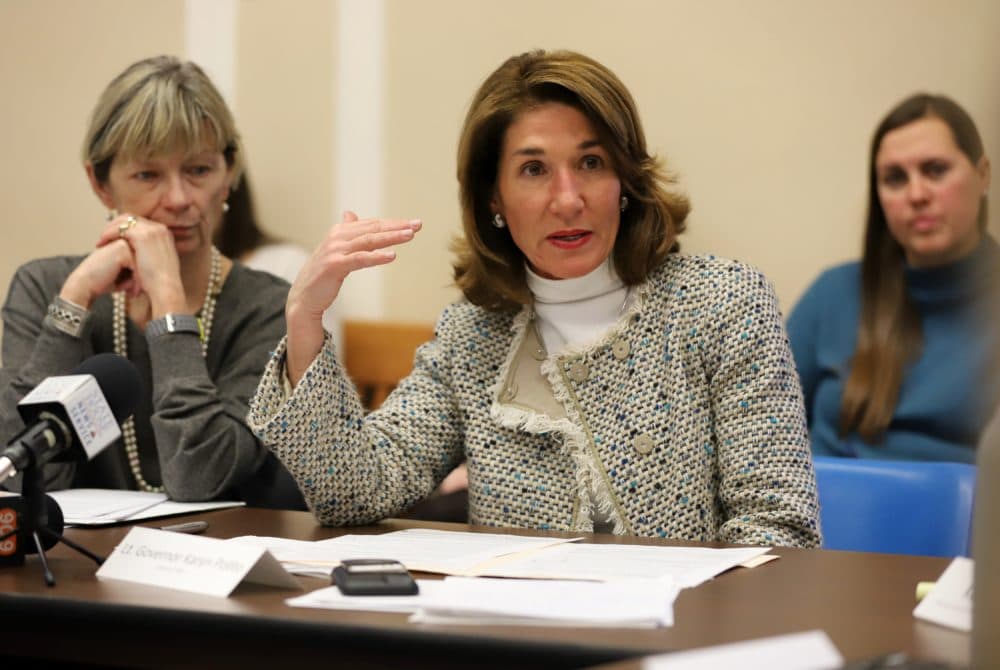Advertisement
Lt. Gov. Polito Says It Is Urgent To Pass Bill To Make Revenge Porn A Felony

Lt. Gov. Karyn Polito said she'll "put my shoulder behind" a bill she announced Wednesday to rewrite the state's laws around sharing sexually explicit images, saying the state must respond to technological changes and protect its youth.
The bill addresses the forms of image-sharing sometimes known as sexting and revenge porn. It would both allow anyone under the age of 18 to be diverted from the criminal justice system, at a prosecutor's discretion, and create a new penalty for adults distributing explicit images for revenge or embarrassment purposes.
"While we are very progressive in this commonwealth and proud that we are first in many areas, 40 other states have laws in place to protect from the distribution of sexually explicit images," Polito said at a meeting of the Governor's Council to Address Sexual Assault and Domestic Violence. "This is not a place where we're leading and clearly we have the opportunity to do so."
The bill, which Gov. Charlie Baker first proposed in April 2017, would make it a felony offense to share a sexually explicit image without consent from the person depicted.
According to Baker's office, it would close a loophole in state law, which addresses non-consensual recording of a person but does not consider instances where an image is shared without consent, regardless of whether the person agreed to the picture being taken.
"With advancements in technology, we need to also create some updates to our laws to better protect people from using technology as a weapon."
Lt. Gov. Karyn Polito
"With advancements in technology, we need to also create some updates to our laws to better protect people from using technology as a weapon," said Polito, who stepped into the role of acting governor Wednesday while Baker was in Washington, D.C. testifying about climate change.
Current law also makes minors who share sexually explicit images among their peers subject to child pornography charges, which are felonies.
The governor's bill would instead have minors enroll in an educational diversion program, which district attorneys could bypass in certain instances and instead take to the juvenile justice system. The district attorneys would be able to decide if a minor should be charged with a misdemeanor or felony offense.
Rep. Jeffrey Roy, a Franklin Democrat, filed a similar bill dealing with sharing of sexual images by teenagers. The issue came to his attention, he said, around 2016, when the police chief in his town approached him about a "widespread sexting incident," involving about 60 high schoolers.
Advertisement
"He was talking to me and saying, what I have under current law is the option of charging them with nothing, or charging them with a felony possession of child pornography," Roy said. "He said, 'I'm struggling with that as my only two choices to deal with the situation.' "
Roy said his bill and Baker's each go "a long way toward providing teachable moments for children to understand the consequences."
Jennifer Queally, the state's deputy secretary of public safety and security, recalled a case from when she was at the Middlesex District Attorney's Office in 2008, when a 13-year-old girl from Billerica "had no idea that sending a picture to her boyfriend was going to go through the entire high school."
"The trauma, and everything else, and then if nothing was going to be done because, again, the only option was child pornography, that was sending the wrong message, too," Queally said. "The only real option here is this legislation and that will solve these issues."
Northwestern District Attorney David Sullivan, Chelsea Police Chief Brian Kyes, and Health and Human Services Secretary Marylou Sudders also spoke in support of the bill during the council's meeting.
The bill would also loop sexually explicit images into existing cyberbullying laws, charging schools with providing "age-appropriate" information to their students on the risks and negative effects of creating, possessing and distributing such images of minors.
Last session, the Judiciary Committee redrafted Baker's bill and two others into a new piece of legislation, which ultimately died in the House Ways and Means Committee.
Baker, in a statement, said the previous version of the bill garnered "strong bipartisan support from legislators, educators and district attorneys" and that he looks forward to working with lawmakers to pass it this session.
Asked why she believed the bill did not pass last time, Polito said, "The legislative process is a challenging one," noting that thousands of bills are filed each session.
"I think it's just a situation where we need to do more work in informing our colleagues in the Legislature and engaging the stakeholders, parents, educators and community leaders how important this is and to help it rise up and bubble to the top as a priority," she said. "There are too many instances where this is a reality, but it's not being recognized as perhaps something that's urgent. I believe, and our administration believes that there's urgency to this."